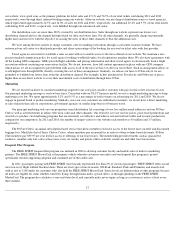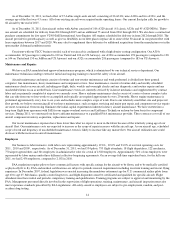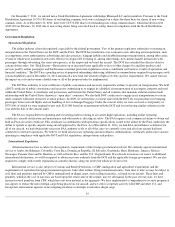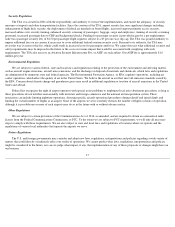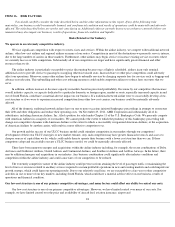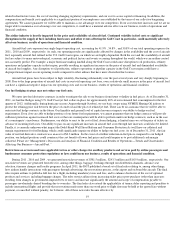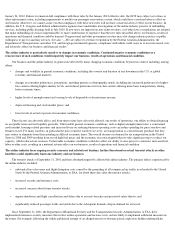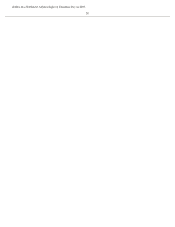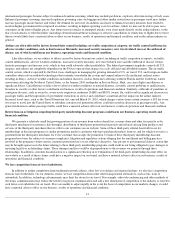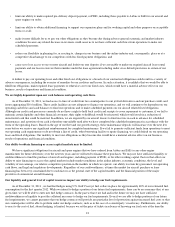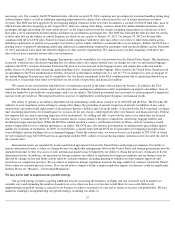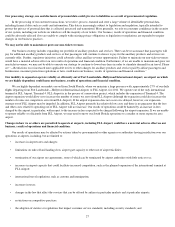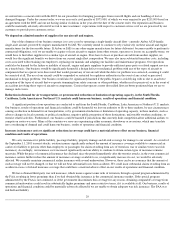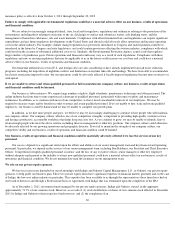Spirit Airlines 2011 Annual Report Download - page 25
Download and view the complete annual report
Please find page 25 of the 2011 Spirit Airlines annual report below. You can navigate through the pages in the report by either clicking on the pages listed below, or by using the keyword search tool below to find specific information within the annual report.
international passengers became subject to enhanced random screening, which may include pat-
downs, explosive detection testing or body scans.
Enhanced passenger screening, increased regulation governing carry-on baggage and other similar restrictions on passenger travel may further
increase passenger inconvenience and reduce the demand for air travel. In addition, increased or enhanced security measures have tended to
result in higher governmental fees imposed on airlines, resulting in higher operating costs for airlines, which we may not be able to pass on to
consumers in the form of higher prices. Any future terrorist attacks or attempted attacks, even if not made directly on the airline industry, or the
fear of such attacks or other hostilities (including elevated national threat warnings or selective cancellation or redirection of flights due to terror
threats) would likely have a material adverse effect on our business, results of operations and financial condition, and on the airline industry in
general.
Airlines are often affected by factors beyond their control including: air traffic congestion at airports; air traffic control inefficiencies;
adverse weather conditions, such as hurricanes or blizzards; increased security measures; new travel related taxes or the outbreak of
disease, any of which could harm our business, operating results and financial condition.
Like other airlines, we are subject to delays caused by factors beyond our control, including air traffic congestion at airports, air traffic
control inefficiencies, adverse weather conditions, increased security measures, new travel related taxes and the outbreak of disease. Delays
frustrate passengers and increase costs, which in turn could adversely affect profitability. The federal government singularly controls all U.S.
airspace, and airlines are completely dependent on the FAA to operate that airspace in a safe, efficient and affordable manner. The air traffic
control system, which is operated by the FAA, faces challenges in managing the growing demand for U.S. air travel. U.S. and foreign air-traffic
controllers often rely on outdated technologies that routinely overwhelm the system and compel airlines to fly inefficient, indirect routes
resulting in delays. Adverse weather conditions and natural disasters, such as hurricanes affecting southern Florida and the Caribbean, winter
snowstorms affecting the Northeast United States, or the January 2010 earthquake in Port-au-Prince, Haiti, can cause flight cancellations or
significant delays. Cancellations or delays due to adverse weather conditions or natural disasters, air traffic control problems or inefficiencies,
breaches in security or other factors could harm our business, results of operations and financial condition. Similarly, outbreaks of pandemic or
contagious diseases, such as avian flu, severe acute respiratory syndrome (SARS) and H1N1 (swine) flu, could result in significant decreases in
passenger traffic and the imposition of government restrictions in service and could have a material adverse impact on the airline industry.
Increased travel taxes, such as the Travel Promotion Act, enacted March 10, 2010, which charges visitors from certain countries a $10 fee every
two years to travel into the United States to subsidize certain travel promotion efforts, could also result in decreases in passenger traffic. Any
general reduction in airline passenger traffic could have a material adverse effect on our business, results of operations and financial condition.
Restrictions on or litigation regarding third-party membership discount programs could harm our business, operating results and
financial condition.
We generate a relatively small but growing portion of our revenue from order referral fees, revenue share and other fees paid to us by
third-party merchants for customer click-throughs, distribution of third-party promotional materials and referrals arising from products and
services of the third-party merchants that we offer to our customers on our website. Some of these third-party referral-based offers are for
memberships in discount programs or similar promotions made to customers who have purchased products from us, and for which we receive a
payment from the third-party merchants for every customer that accepts the promotion. Certain of these third-party membership discount
programs have been the subject of consumer complaints, litigation and regulatory actions alleging that the enrollment and billing practices
involved in the programs violate various consumer protection laws or are otherwise deceptive. Any private or governmental claim or action that
may be brought against us in the future relating to these third-party membership programs could result in our being obligated to pay damages or
incurring legal fees in defending claims. These damages and fees could be disproportionate to the revenues we generate through these
relationships. In addition, customer dissatisfaction or a significant reduction in or termination of the third-party membership discount offers on
our website as a result of these claims could have a negative impact on our brand, and have a material adverse effect on our business, results of
operations and financial condition.
We face competition from air travel substitutes.
In addition to airline competition from traditional network airlines, other low-cost airlines and regional airlines, we also face competition
from air travel substitutes. On our domestic routes, we face competition from some other transportation alternatives, such as bus, train or
automobile. In addition, technology advancements may limit the desire for air travel. For example, video teleconferencing and other methods of
electronic communication may reduce the need for in-
person communication and add a new dimension of competition to the industry as travelers
seek lower-cost substitutes for air travel. If we are unable to adjust rapidly in the event the basis of competition in our markets changes, it could
have a material adverse effect on our business, results of operations and financial condition.
21


